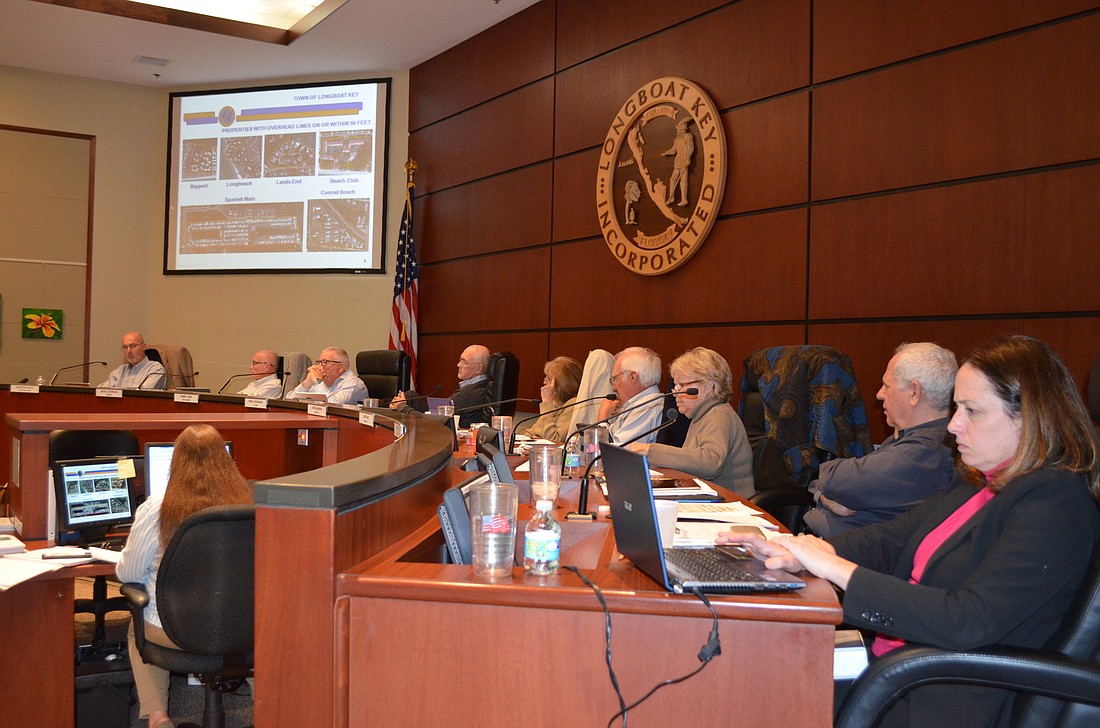- December 12, 2025
-
-
Loading

Loading

The town is coming down to the wire for an upcoming underground utilities referendum.
The Longboat Key Town Commission is still committed to holding a referendum March 15, to ask voters to issue bonds for a $23.85 million neighborhood project to bury power lines islandwide. And after five hours of discussion at their workshop Tuesday, commissioners also agreed to commit to the original funding mechanism that has property owners with existing underground utilities paying 18.5% of the project’s cost and owners with above-ground utilities paying for 81.5% of the project through their tax bills.
But with less than two months until Election Day, commissioners still have questions about several issues, and that's making Town Manager Dave Bullock nervous. Although the Jan. 8 deadline for submitting ballot language to supervisor of elections offices has passed, the commission can continue to discuss funding options until Election Day as long as the concepts fit within the referendum question's guidelines. Still, Bullock told the commission that Feb. 16 (date of the commission's workshop) is the last day he feels comfortable making changes or taking direction on the evolving project before the election, because staff plans to undertake a public education effort around the Key before voters head to the polls.
“But I’m out of my comfort zone past Feb. 16,” Bullock said.
As the clock ticked five hours closer to Election Day Tuesday, Bullock presented an option that would allow the town to use up to $3,295,369 of its fiscal 2016 non-ad valorem revenue — generated from sources such as business taxes, Florida Power & Light Co. franchise fees and sales tax sources — after Mayor Jack Duncan asked Bullock to find ways reduce assessments islandwide earlier this month. The idea gained 5-2 consensus early in the meeting but was disregarded five hours later by a 6-1 consensus.
The plan would have reduced the assessment for a Longbeach Village home with above-ground utilities from $566.17 to $452.94 a year over 30 years at a 6% interest rate if the town used 20% of its non-ad valorem revenue, or $283.09 annually if the town used 50% of its non-ad valorem revenue.
But using non-ad valorem funds to pay down the assessments every year for 30 years would reduce the town's budget. As a result, the town would need to reduce town services, increase non-ad valorem revenue or increase the millage rate for property taxes.
"...if this was 2010, we would be backfilling a reduction in general revenue that we didn’t have,” Bullock said. “If we pledge operating money, we have to replenish it somehow."
The town, though, didn’t have any information available that would show the potential increase in taxes that would be needed to offset the loss of non-ad valorem money.
“You need a column to show their total new tax bill,” said Vice Mayor Terry Gans.
Commissioner Phill Younger called the proposal “a shell game.”
“It’s a shifting of costs from non-ad valorem to ad valorem," Younger said. "To try and shift these costs is amazing, and I’m disgusted.”
Country Club Shores resident Shannon Gault called the concept “wrong, dishonest and unethical.”
“Don’t sneak a tax increase on our backs,” Gault said. “I can cough up an extra $153 per year, but I am not paying additional money in taxes. This is just wrong.”
Commissioners agreed it was best to stick with its current funding approach.
“I like it (the concept), but I don’t think it’s right,” Gans said.